Movie Review – War Horse
Principal Cast : Jeremy Irvine, Emily Watson, Peter Mullan, David Thewlis, Benedict Cumberbatch, Tom Hiddleston, Eddie Marsan, Toby Kebbell, Niels Arestrup, David Cross, Liam Cunningham, Leonard Carow, David Kross, Celine Buckens.
Synopsis: A horse trained by a young English boy is seconded into the military upon the outbreak of the First World War, and throughout the conflict finds itself owned and disowned by a variety of folk, all on their own journey through the conflict. As the war progresses, the horse and the boy eventually find each other – although the emotional turmoil they endure will leave them changed forever….
**********************
That awkward moment when you love your horse a little too much.
I am scared of horses. They’re big, gangly beasts that I’m certain would squash me if they fell on me, and as a result, I show respect to that by avoiding them altogether. I’ve only ever ridden a horse once, enough years ago now that the memory is only a hazy one, but my adult engagement with them has (thankfully) amounted to exactly zero. No, I’m not a fan of them in real life, although they’re cool enough when you see them on screen in any way. Their skittish natures, especially when spooked, make them unpredictable animals, and I’m a big fan of predictability. How thankful I am, then, that it wasn’t me who had to make War Horse into a film. And what a film it is: a true throwback to the widescreen epics of yesteryear, with glorious panoramic footage mixed with larger than life characters and scenarios, delivering a potentially breathtaking story to the masses. Spielberg has long claimed to be influenced by the late Sir David Lean (director of films such as Lawrence Of Arabia), and you can really tell he’s mined that influence with War Horse, a film featuring stunning cinematography and magnificent European vistas and locations, even if the characters feel a little thinly developed. The final shots of the film (don’t worry, I’m not about to give away any spoilers) are instantly recognizable as Lean-esque, with Spielberg making use of a glorious golden hue to bring the story full circle in a way we’ve not seen in modern film for decades.
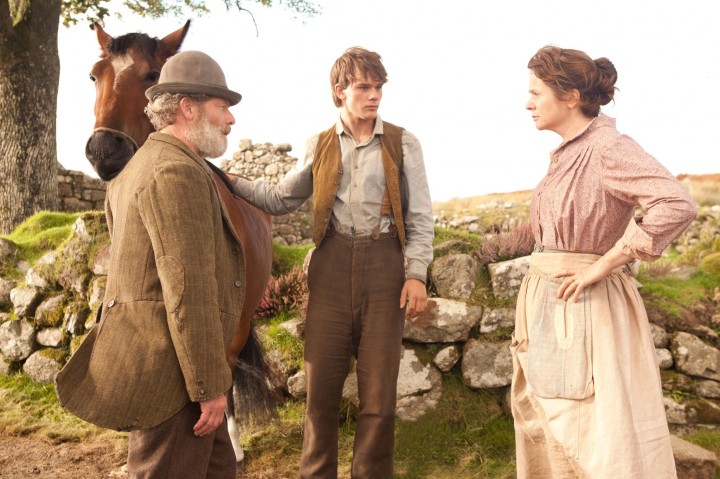
Teenage boy Albert Narracott (Jeremy Irvine) lives on a debt-ridden farm with his father (Peter Mullan) and mother (Emily Mortimer), when his father purchases a thoroughbred horse with which to work the fields. The family’s landlord, Lyons (David Thewlis) is sure the horse will never be able to work the rocky land, and pressures the family with eviction should they fail to pay their back rent in time. Of course, the horse, whom Albert names Joey, is strong and able to do just that. However, Joey is soon seconded for use by the British cavalry upon the outbreak of the conflict which would become known as The Great War, and although Albert isn’t old enough to enlist, he decides to do so as soon as he can. Joey, meanwhile, is used as the main mount by cavalry rider Captain Nicholls (Tom Hiddleston), whereupon they lead a surprise charge across a field to defeat a platoon of German solders. Unfortunately, Nicholls is killed, leaving Joey to be cared for (ha!) by the German army, who put the horse to work carrying injured soldiers from the battlefield. Two German soldiers go AWOL with Joey and another horse, named Topthorn, who hide away in a French windmill – both horses are found by local girl Emilie (Celine Buckens), who is struck with a crippling illness, and who is cared for by her grandfather (Niels Arestrup). When the Germans arrive to seconder the horses again, Joey and Topthorn are put to work dragging the enormous cannons of the military up steep hills, an exhausting practice which saw the German’s destroy many a good horse. Finally, Joey ends up in the midst of the trench warfare of the war, finding his way into No Man’s Land, where he is encased by reels and reels of barbed wire as he runs through the fighting.
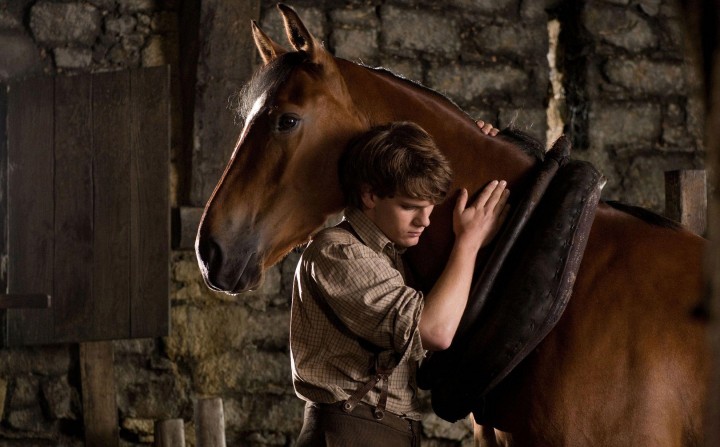
As I was watching this film, I kept thinking to myself that if Joey sat up and said “Life is like a bahx of chaacolates” I’d probably barely have registered any surprise whatsoever. War Horse is similar in structure to Forrest Gump, insomuch as Joey straddles both ends of a historical period from birth to eventual conclusion, weaving through the conflict and impacting all those he encounters. Unlike Gump, though, Joey doesn’t say much; rather, he’s a horse of deeds, and although perhaps not quite as proactive as I’d expected from this kind of story, still manages to evoke a reaction from the audience. War Horse isn’t so much a historical narrative as much as it’s a fantasy adventure, a Lassie Come Home for the modern generation, with Jeremy Irvine’s Albert being the central human pivot on which much of the emotion rides. The film tries to dig into deeper themes than Spielberg’s often saccharine style would normally allow, and partly succeeds (although not entirely) thanks to Lee Hall and Richard Curtis’s overly melodramatic screenplay.
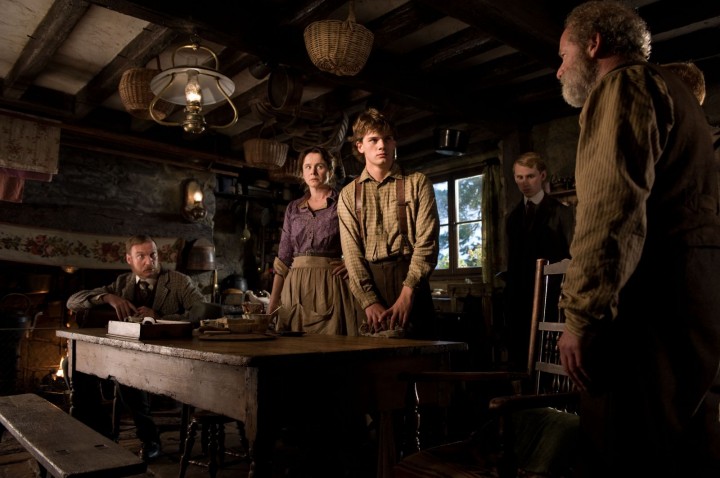
The film is based on the original novel by Michael Murpurgo, which was published in 1982. The novel is told entirely from the perspective of the horse, Joey, and the stage play version is (from what I’ve heard, correct me if I’m wrong) is much the same; Spielberg wisely decided not to go the anthropomorphic “talking” horse route and allow Joey to exist as the focal point on which this story is told, albeit through human stories in wartime. A wise move, in the end, because War Horse would have felt somewhat silly had the horse done any voice-over narration. Joey is just another character in the film, although his status is enlarged mainly thanks to the key narrative thrust of Albert’s pursuit of him through the battlefields of Europe. Lee Hall and Richard Curtis deliver a script which initially seems flawed to the side of “aww shucks”, but ends up actually being pretty touching at times. Curtis, who gave us emotional turnips in the form of Love Actually and Notting Hill, has a deft touch on the film’s more mawkish moments, particularly as Albert must watch Joey be led away by Nicholls’ second in command, ensuring things never become too drawn out or sentimental (plenty of time for that later, eh?).
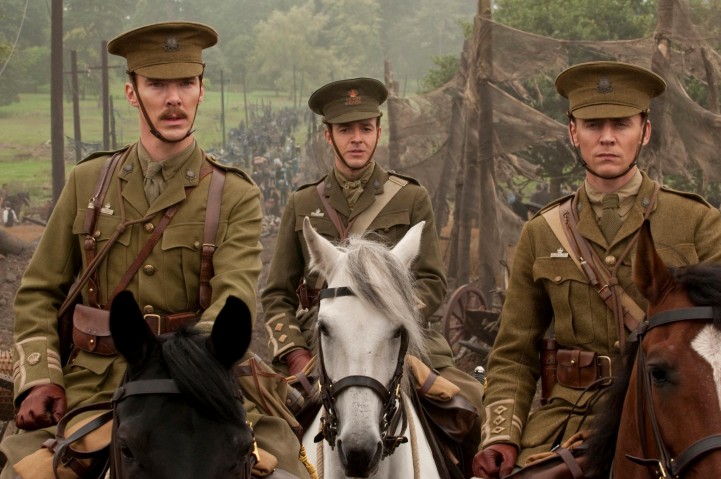
Exactly what the purpose of this story is, I’m still not too sure. As a diatribe against using animals in combat, or how man has treated horses poorly in the past, perhaps it’s moderately successful. What I’d stress, however, is that the film seems a bit muddled in exactly what it’s focusing on – my own opinion is that it’s supposed to be the friendship between Albert and Joey, although considering how much time they spend apart (almost the entirely of the war, which lasted 4 years!) this is a stretch to believe. With all the various characters moving through this story, War Horse can’t quite spend enough time making sure we feel for each of the people involved; the opening sequence, in which we’re introduced to Joey, Albert and his family, and have Joey’s unique personality constructed somewhat laboriously by Spielberg, is the most poignant of the film, and it’s only after Joey leaves for war that the film tends to become too disjointed to be truly memorable. Tom Hiddleston’s Captain Nichols, for example, has a great rapport with Benedict Cumberbatch’s Major Stewart, a sporting one-upmanship between them that is actually pretty interesting (thanks moreso to Cumberbatch’s sublime acting style), and yet this moment in the film is undermined by a crucial lack of character development in either – a problem for most of the film, really – and the “end” of their time with Joey seems perfunctory and almost casual in impact.
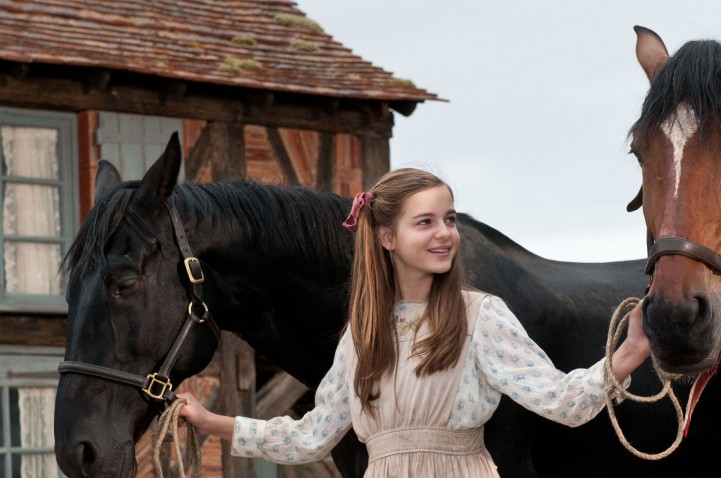
Jeremy Irvine, in his debut film role, is easily likeable as Albert, the young lad who trains up Joey on his father’s farm, and whom is especially crushed when Joey is sent off to help with the war effort. Irvine has the good looks and the natural film talent to go a long way, and I suspect he’s on the fast track to success thanks to his association with Spielberg (having said that, we can only hope and pray he avoids the pitfalls encountered by similarly encumbered Shia LaBeouf!). His performance, alongside the equally wonderful Emily Mortimer and Peter Mullan, feels effortless and untrained, as if he was just picked off the street by the production team. Of note, David Thewlis returns to the Bad Guy status he enjoyed prior to Harry Potter as the sniping, antagonistic landlord of Albert’s family farm. Thewlis delivers a terrific performance designed to have the viewer wanting to smack him in his upstart mouth, and it’s here the film generates much of its emotional wallop – before the war starts and Thewlis’s character evaporates from the story.
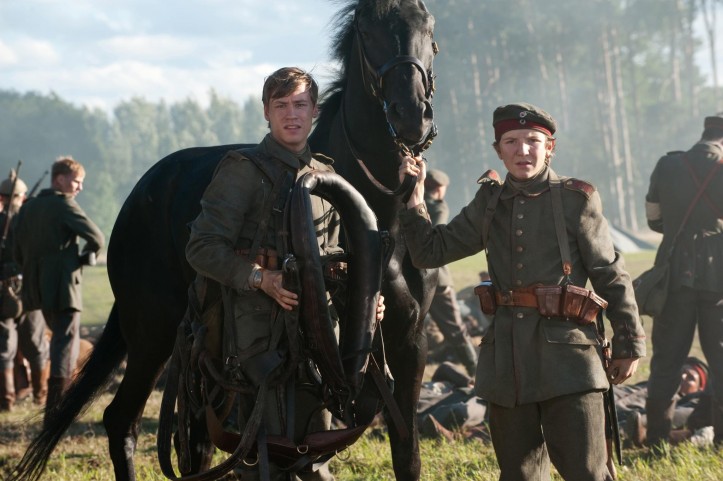
A particularly moving sequence involves French girl Emilie and her Grandfather – portrayed respectively by Celine Buckens and Niels Arestrup. Buckens is eminently watchable in a naturalistic portrayal of an orphaned girl who’s sick with an undisclosed illness, and Arestrup delivers a quite moving portrayal of an older man trying to protect his family from the horrors of war. In a weird parallel, it seems the Grandfather and Albert’s drunken ex-soldier father are cut from the same cloth (albeit one without the alcohol, I guess!) in that they’re both apparently unwilling to discuss their time in the military, a tip of the hat to post-traumatic stress disorder, I guess. I’m not sure it was intended, but it was most definitely noted. The Emilie/Grandfather sequence in particular is well filmed by Spielberg, capturing a further echo of innocence in a world rapidly losing it. The sequences of war, initially confined to the German-themed moments in the film, are of brutality and death, and while not skirting the issue, Spielberg decides not to go all Saving Private Ryan on us. Instead, cinematographer Janusz Kaminski delivers a softer colour palette for the film, with earthen tones for the Good Guys moments, and dark greys and blacks any time the Germans get involved. The final sequence set in No Man’s Land, for example, is filmed almost exclusively at night, paving the way for high contrast, shadowy evocations of death and carnage without the gore.
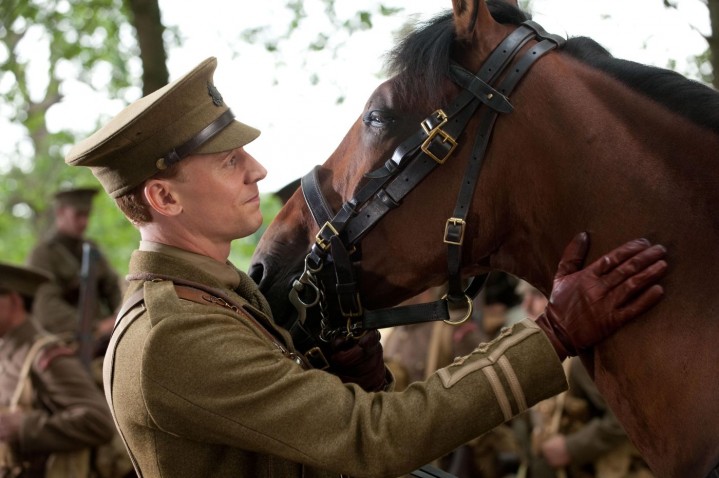
Regardless of what you think of the film’s story, there’s no denying this is one handsomely gorgeous production. Every frame of this is vintage Spielberg, and easily some of Kaminski’s best photography. The gorgeous English locations (the films exteriors were shot in Wiltshire, Surrey and Dartmoor, in England, among other places) are truly postcard material, with Kaminski’s brilliant lensing of them harkening back to those old technicolor films and their lush, rich cinematography. Even the grittier, dirtier moments of the film look amazing, a truly refreshing change from the desaturated images of war we’ve become accustomed to in the last few decades. Massive cavalry charges, the enormous expanse of No Man’s Land, the rolling hills of Devon, and even the lush French countryside all look stunning, as Spielberg seeks to engender a more romantic feeling towards the film than one of horror – this is a fantasy, after all, and you get the sense that he went into this with that understanding writ large across all aspects of the production. Even the score, by Spielberg regular John Williams, is proactively sweeping in scope and style. Orchestral music accompanies almost every moment of the movie, and although at times the music does feel like it’s forcing us into feeling something instead of merely enhancing that feeling, it’s truly an epic (if largely unmemorable) work from the inimitable Williams.
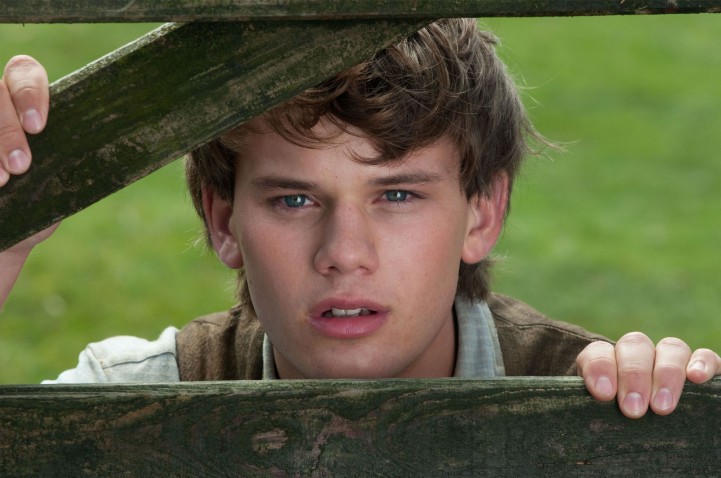
The only real flaw I could find with the entire film is that the audience never really gets the sense of Joey’s emotional state. If it’s possible to ever have such a thing. While the original novel was told through the eyes of the horse, here it simply cannot be that way, and the impact of the events portrayed as such are left unable to find their feet within the idea that it’s “Joey’s journey”… and Albert’s limited role once Joey goes to war doesn’t help. There’s an isolation between audience and Joey that can’t be overcome with sweeping music or breath-taking close-ups on Joey’s soulful eyes, no matter how hard you try. This subtle distance prevents War Horse from being the truly magnificent opus it could have been, but in saying that it’s still a pretty amazing film. Those who find scenes of animals in distress distressing should be warned: take a box of tissues into this film, especially towards the end where Joey gallops headlong through the barbed wire of No Man’s Land to his peril, encasing himself in the horrible stuff until he cannot run any further – it’s not as grisly as it could have been, but it’s still affecting.
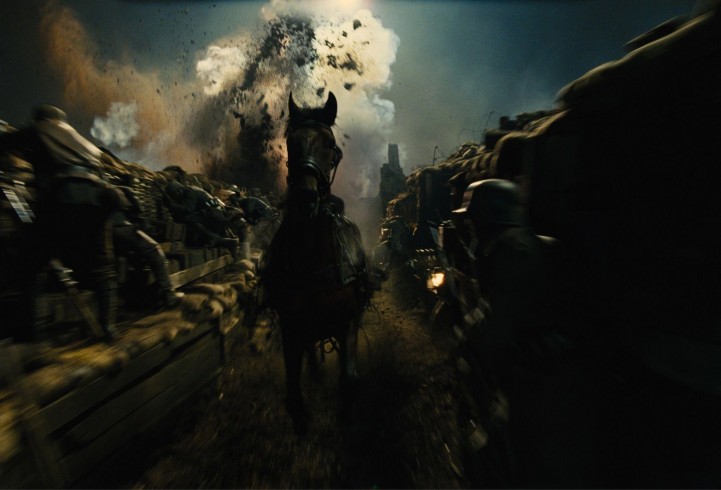
War Horse might not be Spielberg’s best film, not when weighed up against the films he made in the 70’s and 80’s, but as a throwback to a style of film-making long since dormant, it’s pretty darn respectable. The film opens strongly, seems to buckle under its own weight midway through, and comes home with a flash and a flurry; the ending, which I’ve heard described as overly sentimental, is pure Spielbergian fantasy, even if it’s not quite in tune with the preceding 130 minutes. I’m hardly inclined to consider War Horse as a true masterpiece – the film is flawed in a few areas, not the least is the imbalance of horsey and human action – but it is a genuinely solid, easily watchable entertainment spectacle.

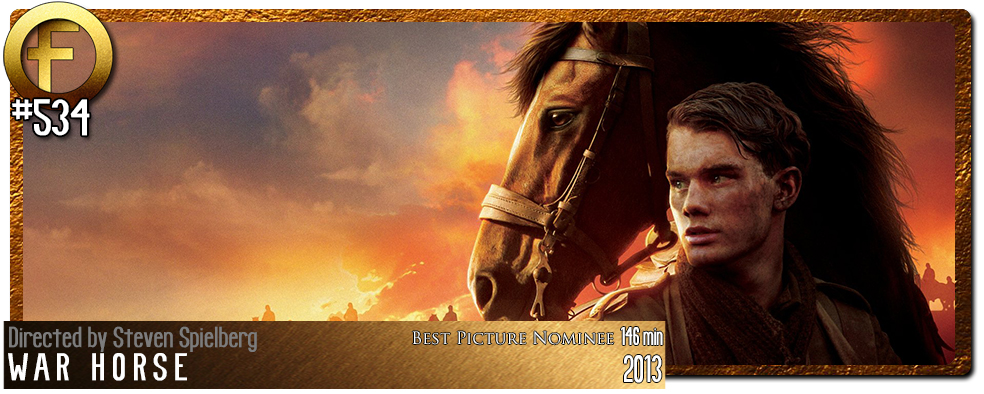
Animal movies are the only thing wore than sports movies. Best just to put it out of my misery.
My recent post Booze Revooze: TWILIGHT: BREAKING DAWN (PART 2)
Shotgun at the ready, eh Al?
Haven't seen it and to be honest I doubt I will… BORE HORSE
My recent post Cinecity Top 10 Poll – 2009 – A Prophet
Oh c'mon man, it's not THAT bad!! 😉
Nice review Rodney, If only this film was as entertaining as your synopsis of it.
I take it you didn't like it then? LOL!! Glad you enjoyed the review!